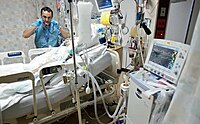
Photo from wikipedia
BackgroundGeneral anesthesia induction with the initiation of positive pressure ventilation creates a vulnerable phase for patients. The impact of positive intrathoracic pressure on cardiac performance has been studied but remains… Click to show full abstract
BackgroundGeneral anesthesia induction with the initiation of positive pressure ventilation creates a vulnerable phase for patients. The impact of positive intrathoracic pressure on cardiac performance has been studied but remains controversial. 3D echocardiography is a valid and MRI-validated bed-side tool to evaluate the right ventricle (RV). The aim of this study was to assess the impact of anesthesia induction (using midazolam, sufentanil and rocuronium, followed by sevoflurane) with positive pressure ventilation (PEEP 5, tidal volume 6–8 ml/kg) on 2D and 3D echocardiography derived parameters of RV function.MethodsA prospective observational study on fifty-three patients undergoing elective cardiac surgery in a tertiary care university hospital was designed. Transthoracic echocardiography exams were performed before and immediately after anesthesia induction and were recorded together with hemodynamic parameters and ventilator settings.ResultsAfter anesthesia induction TAPSE (mean difference − 1.6 mm (95% CI − 2.6 mm to − 0.7 mm; p = 0.0013) as well as the Tissue Doppler derived tricuspid annulus peak velocity (TDITVs’) were significantly reduced (mean difference − 1.9% (95% CI: − 2.6 to − 1.2; p < 0.0001), but global right ventricular ejection fraction (RVEF; p = 0.1607) and right ventricular stroke volume (RVSV; p = 0.1838) did not change.ConclusionsThis data shows a preserved right ventricular ejection fraction and right ventricular stroke volume after anesthesia induction and initiation of positive pressure ventilation. However, the baso-apical right ventricular function is significantly reduced. Larger studies are needed in order to determine the clinical impact of these findings especially in patients presenting with impaired right ventricular function before anesthesia induction.Trial registrationRetrospecitvely registered, 6th June 2016, ClinicalTrials.gov Identifier NCT02820727.
Journal Title: BMC Anesthesiology
Year Published: 2019
Link to full text (if available)
Share on Social Media: Sign Up to like & get
recommendations!